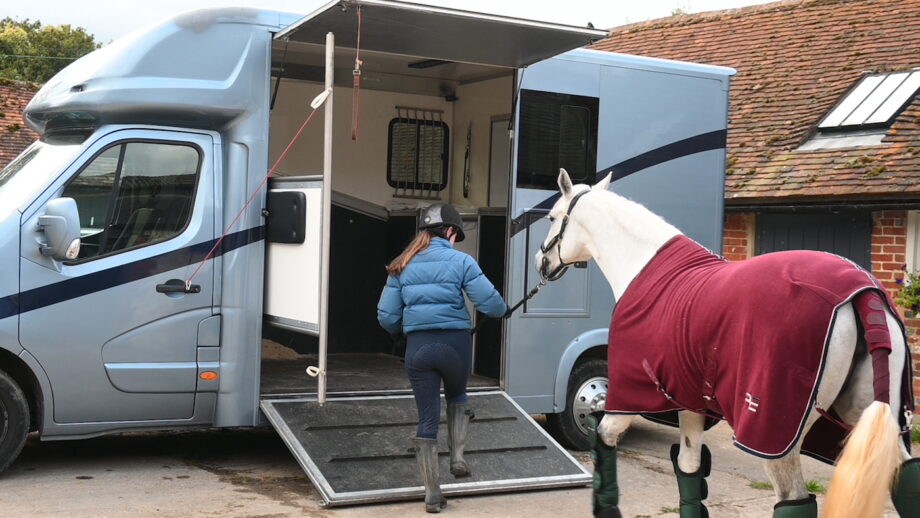The holidays are in full swing and equestrians are urged to ensure they are not overloading their horsebox as they head out and about this summer.
The National Association of Racing Staff (NARS) recently shared a warning to members who drive small (3.5 tonne) boxes.
It said it is “aware of three different boxes that have been stopped recently”.
“Please ensure compliance before embarking on any journey, take necessary precautions to avoid fines and disruptions to your journey,” added the spokesperson.
NARS also referred to technology used to identify overweight vehicles on British roads; weigh-in-motion (WIM) sensors, linked to automatic number plate recognition (ANPR) cameras.
A spokesperson for the Driver and Vehicle Standards Agency (DVSA) told H&H it started using WIMs in June 2004, in conjunction with the Highways Agency (now National Highways).
The spokesperson added that it developed and introduced WIM sensors linked to ANPR cameras in 2007 and that there are 14 sites using this linked technology across Britain.
“The DVSA’s priority is to protect everyone from unsafe drivers and vehicles,” the spokesperson told H&H.
“Horses are precious cargo, so it’s hugely important that horsebox owners know the weights and limits of their vehicle and trailer combinations, as well as the load, to ensure that they are not exceeded.
“The vehicle or trailer needs to be properly maintained all year, not just for its annual MOT.”
Penalties for a person driving an overloaded vehicle include fines, points and prohibition notices, which means the vehicle may not be driven any further until the problem (in this case, weight) is fixed.
A vehicle’s registered weight, for example, 3.5 tonne, is the maximum it is allowed to weigh – including load – on the road. Just because a vehicle is stalled for a certain number of horses does not mean it can legally carry that many. Drivers need to know the unladen weight of the vehicle and of everything in it to ensure they are not breaking the law.
Chris Facer of Equine Rescue Services told H&H vehicle inspectors are clamping down on overloaded vehicles.
“This is a busy time, with school holidays, camps and events,” he said. “Overloading vehicles can lead to premature wear and tear of components, and worst-case scenario, can actually compromise the structure of a vehicle.”
He added that overloading can damage a vehicle’s suspension and puts greater pressure on tyres, which can overheat and blow out, and brakes.
“You’re overworking the engine by carrying so much weight and you’re also going to use more fuel,” he said. “If you’re really heavy on the back end, that can sometimes cause the steering to feel very light and that leads to instability.
“So it is important you keep the vehicle within its weight limit, not just for you, your passengers and your horses, but for other road users as well.”
Mr Facer also encouraged equestrians to make sure their vehicles are generally ready for a busy summer.
“Tyre-related problems account for around 15–20% of breakdowns we encounter,” he said. “That’s not necessarily because they’ve been unfortunate enough to have a puncture, but because the tyres have been left and started to crack, and tyres get old.
“It’s worth getting the vehicle checked over properly. It can save you a lot of stress and inconvenience. Do everything you possibly can to reduce the chance of breaking down.”
Heading to camp? How it can roughly add up…
- 14.2hh pony: 350–480kg
- Water for horses: 45kg
- Small bale of hay: 15–18kg
- Saddle: 5–7kg
- Sack of feed: 20kg
- Bale of shavings: 15–20kg
- Plus passengers, fuel, camp beds, wheelbarrow, tools, grooming kit
- To stay up to date with all the breaking news from major shows throughout 2025, subscribe to the Horse & Hound website
You may also be interested in:

‘We’re delighted to bring loyal readers this benefit’: H&H magazine subscribers get free website access

Owners ‘putting horses’ lives at risk’ by failing to check horseboxes
NFU Mutual is urging parents to talk to their children about horsebox safety to help educate the next generation about

How to avoid overloading your lorry
Driving an overweight horsebox is illegal and dangerous, but there are things you can do to help stay within the

Check your horsebox tyres for safety – and to avoid ‘unlimited’ fine




